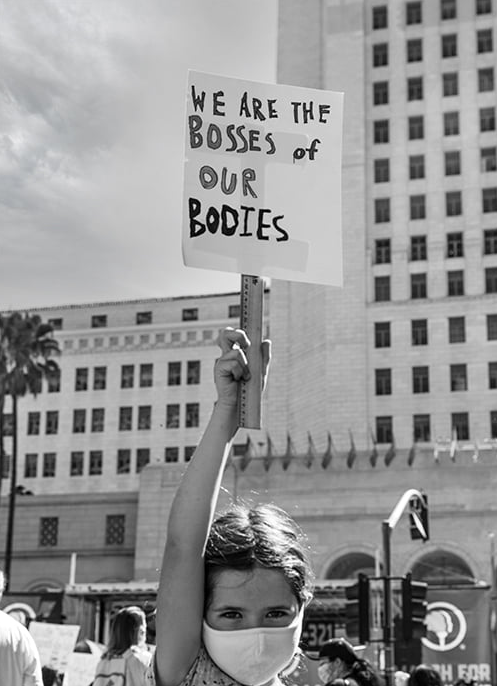
Saturday, October 2, saw marches advocating women’s reproductive rights in some 650 cities in all 50 US states.
In New Mexico, marches were scheduled to be held in Alamogordo, Albuquerque, Las Cruces, Santa Fe, Silver City and Taos.
No Lea County cities appeared on the list of planned marches.
Women’s March Organized the October 2 Nationwide Protest
Women’s March, with the help of some 90 women’s rights groups, organized “a national call to mobilize and defend our reproductive rights,” states the “Pledge to Mobilize” published on the Women’s March website. “Abortion has never been fully accessible, but we are at the risk of losing our reproductive freedom completely.”
The nationwide rally was held in response to the State of Texas’s new restrictive abortion law, as well as actions in Mississippi and other states that have threatened a woman’s right to choose. The October 2 event turned out to be the largest single-day march since the historic 2017 rally that also supported a woman’s right to have an abortion.
Though abortion is a highly controversial topic, the overwhelming majority of Americans support some degree of access to abortion.
Supreme Court Refused to Block the Texas Law

The mass march was organized after the U.S. Supreme Court one month ago, on September 1, refused to block Texas’ new restrictive abortion law in an unsigned, 5-4 decision.
Specifically, the new Texas law, known as State Bill 8, prohibits an abortion to be administered in Texas “after fetal cardiac activity is detected, a point that could occur as early as six weeks into pregnancy — before many women even know they are pregnant,” states an article by Adam Edelman posted at nbcnews.com.
The Supreme Court in its decision did, however, leave the door open for the Texas law to be challenged in the future.
“The decision left open the option for abortion providers to challenge the Texas law in other ways in the future, meaning the case possibly — or even likely — will return to the Supreme Court, though not for months or longer,” states an article from NPR.
Not months but only weeks after the Supreme Court decision, such challenges are already on the drawing board. In fact on Wednesday, October 6, US District Judge Robert Pitman after hearing arguments from the US Department of Justice temporarily blocked the ultra restrictive law from being enforced. In his ruling Pitman states, “This Court will not sanction one more day of this offensive deprivation of such an important right.”
White House Press Secretary Jen Psaki expressed the Biden administration’s support of Judge Pitman’s ruling. She said late on Wednesday,” Tonight’s ruling is an important step forward toward restoring the constitutional rights of women across the state of Texas. The fight has only just begun, both in Texas and in many states across this country where women’s rights are currently under attack.”
Texas quickly countered by announcing that it will appeal the Honorable Judge Pitman’s ruling to the conservative leaning Fifth Circuit Court of Appeals. Until the appeal is heard and a ruling is made, things will remain at a bit of a standstill in Texas. Judge Pitman’s ruling is only temporary, and time will tell what becomes of Texas’s restrictive anti-abortion law.
Texas Women Can Travel to Other States for Abortions
The new Texas law only applies to abortions performed in Texas. The law in no way stops a woman residing in Texas from coming to New Mexico, or any other state, for an abortion.
The free crossing of state lines is a constitutional right afforded to all Americans, and according to Joan Lamunyon Sanford, Executive Director of New Mexico Religious Coalition for Reproductive Choice, New Mexico expects a “significant number” of women to cross state lines from Texas to seek abortions.
The question is whether New Mexico is prepared to manage this influx in abortion patients. In an article by Susan Dunlap published on the NM Political Report website, the answer is no.
The article reports that Adrienne Mansanares, Chief Experience Officer for Planned Parenthood of the Rocky Mountains, says that approximately 3,000 abortions take place in New Mexico each year compared to some 55,000 in Texas.
Mansanares continues that although things in New Mexico are manageable right now, in coming weeks they will not be “if we continue to see the percentage increase from Texas. Abortion clinics in New Mexico cannot continue to absorb the need from Texas abortion patients indefinitely.”
To provide some perspective on the number of abortion patients coming to New Mexico from Texas, Neta Meltzer, Director of Strategic Communicatiobs for Planned Parenthood of the Rocky Mountains, estimates that from September 1 -11 “29% of the total abortion care patients at Planned Parenthood health centers in New Mexico” have been from Texas.
Confirming that New Mexico is seeing more abortion patients than normal, Cindy Foster, Senior Public Affairs Representative at the University of New Mexico Health Science Center, says that abortion patients have doubled at the University of New Mexico Center for Reproductive Health since September 1. According to the center’s website, medical or surgical abortion care is provided up to 23 weeks.
New Mexico Abortion Law
During its regular session earlier this year the New Mexico Legislature repealed a 1969 state statute that banned abortions except in limited circumstances. On February 26, Governor Michelle Lujan Grisham signed the repealed bill into law.
Although four years after its adoption in 1969, the New Mexico law was deemed unenforceable under federal law, the repeal was important. It “adds an extra layer of protection for abortion health care in the state in case Roe v. Wade is overturned by the right-leaning Supreme Court.,” states an article at DailyLobo.com.
The repeal of the 1969 law additionally underlines that New Mexico has one of the most unrestrictive abortion laws in the United States. According to the Guttmacher institute, a “research and policy organization committed to advancing sexual and reproductive health and rights (SRHR) worldwide”, New Mexico, unlike many states, does not have waiting periods, parental involvement mandates or limitations on abortions that are publicly funded.
Lea County Borders Texas
Lea County’s eastern and southern borders run along Texas, making Lea County a close destination for Texas women to come for abortions. However, like most rural areas in New Mexico, Lea County does not have an abortion clinic.
According to an article in the Carlsbad Current Argus, only three counties, Bernalillo, Doña Ana and Santa Fe, have abortion clinics. “Ninety-one percent of counties in New Mexico do not have a facility that offers abortion care.” Typically residents of Lea County would go to Texas, likely Lubbock, for an abortion procedure. In this way, the new Texas law has greatly limited options for some New Mexicans.
Exactly where Lea County officials stand today on the abortion issue is unknown. In 2019 government authorities in Lea, Chaves and Eddy counties adopted unenforceable resolutions supporting “life at conception”.
The New Mexico Department of Health (NMDOH) operates Public Health Offices in both Hobbs, at 1923 North Dal Paso, Suite B, and in Lovington, at 302 North 5th Street. Both clinics offer family planning service but neither offers abortions. For more information about the family planning services offered call 575-397-2463 in Hobbs or 575-396-2853 in Lovington.
UPDATE: October, 8th 8:50 AM – The article was updated to include information regarding the US District Court ruling which temporarily blocked Texas State Bill 8 from being enforced.


